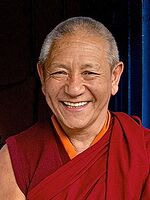Geshe Pema Dorjee
Dorjee, Pema
| PersonType | Category:Authors of English Works Category:Tibetan Buddhist Teachers Category:Geshes |
|---|---|
| FirstName / namefirst | Pema |
| LastName / namelast | Dorjee |
| MainNamePhon | Geshe Pema Dorjee |
| SortName | Dorjee, Pema |
| bio | Geshe Pema Dorjee is an internationally recognized authority, scholar, and teacher of Tibetan Buddhism. His fluent English, keen intellect, clear and practical explanations, warm-hearted nature, and infectious sense of humor enrich his talks and discussions with meaning and inspiration.
He was born into a nomadic family in Tibet in 1951. They escaped from the invading Chinese, and he settled in Dharamsala, India, the seat of the Tibetan government-in-exile and the home of His Holiness the Dalai Lama. From 1973 to 1981 at the Institute of Buddhist Dialectics founded by H.H. the Dalai Lama in Dharamsala, he completed an undergraduate degree and two Masters degrees in Buddhist Philosophy, one in Prajnaparamita (the Perfection of Wisdom) and one in Madhyamika (the Middle Way). For the next 16 years, he dedicated himself to the Tibetan Children’s Village School located in Dharamsala. For nine of those years, he taught Tibetan Buddhism, language, and culture. In 1990, he was appointed Principal of the school, and from 1993 to 1997 he was its Director. In 1995, he earned his Geshe degree at the Drepung Loseling Monastery. Geshe Pema Dorjee served for two years as the Principal of the Tibetan Teachers Training Center. He was then named the first Principal of the College for Higher Tibetan Studies, and he remained in charge of that College from 1997 to 2002. The Tibetan government-in-exile asked him to undertake various tasks. The Cabinet, for example, appointed him to the Higher Level Textbook Review Committee. His Holiness appointed him as a member of the Public Service Commission. The Department of Health appointed him as spiritual counselor to former political prisoners who had been tortured. In 2001, H. H. the Dalai Lama asked Geshe Pema Dorjee to revive an important part of Tibetan Buddhism that had fallen into desuetude, the Bodong tradition. Fulfilling this task required him to establish both a scholarly project and a very practical one. To find the lost writings of that ancient tradition, to study them, translate them, and publish them, he founded in 2003 and continues to direct the Bodong Research and Publication Center in Dharamsala. To educate new monks in the Bodong tradition, he founded and continues to direct the Bodong monastery and school known as Porong Pelmo Choeding in Kathmandu, Nepal. Although he insists that he is only a simple monk, Geshe Pema Dorjee lives the compassionate life about which he preaches. He travels to the most remote and impoverished regions of Himalayan India and Nepal. After a thorough analysis of what is most needed, he creates, organizes, directs, and raises funds for numerous humanitarian projects. These projects include establishing schools, arranging medical care for the sick and injured, providing care for the elderly, creating an orphanage, supporting a drug rehabilitation center, educating villagers to protect them from human trafficking, creating a safe house for street girls, helping young people in Tibetan refugee camps, introducing new agricultural techniques, and providing safe water, toilets, and smokeless cookstoves. Since 1997, he has donated much of his time to teaching and lecturing about Buddhist philosophy in countries around the world, including Sweden, England, Switzerland, Belgium, Germany, Finland, Norway, France, Estonia, India, Nepal, and Israel. Since 2009, Geshe Pema Dorjee has lectured and taught in cities across the United States, including New York, Chicago, Minneapolis, Portland, Miami, San Francisco, Washington, D.C., Boston and Cambridge. (Source: Tibet House US) |
| IsInGyatsa | No |
| Other wikis |
If the page does not yet exist on the remote wiki, you can paste the tag |

